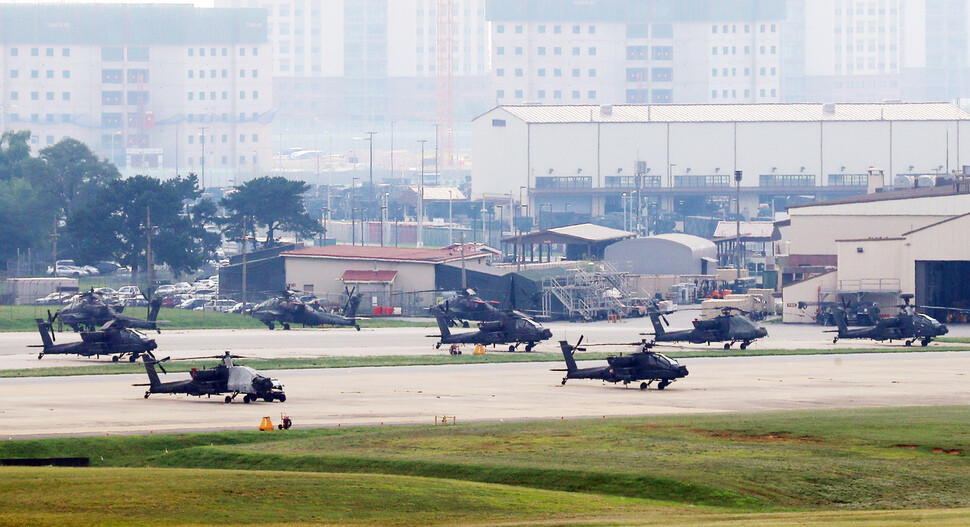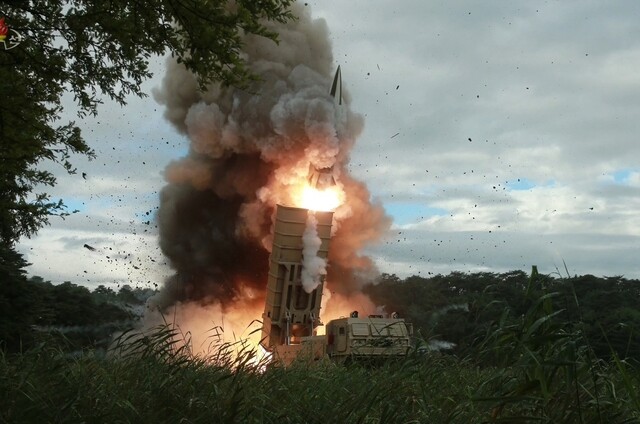hankyoreh
Links to other country sites 다른 나라 사이트 링크
[News analysis] What’s necessary for mending inter-Korean relations

Aug. 20 marked the final day of the South Korea-US joint military exercise that North Korea criticized as a “dangerous prank, a rehearsal for an invasion through a preemptive attack on North Korea” on page six of the Aug. 20 edition of the state-run Rodong Sinmun newspaper. Many experts are hopeful that the long-delayed North Korea-US working-level negotiations will now resume, thereby breathing new life into the choked inter-Korean relationship.
But even if North Korea and the US resume working-level talks, numerous obstacles remain before inter-Korean relations can get back on track, the greatest of which is the abysmal lack of inter-Korean trust. The return of the distinctly North Korean style of invective — which had disappeared after the inter-Korean summit at Panmunjom on Apr. 27, 2018 — is an “indication of crisis,” according to a senior official in the area of foreign policy and security.
This invective was on full display in the Aug. 16 statement by the spokesperson of North Korea’s Committee for the Peaceful Reunification of the Fatherland, which bashed South Korean President Mon Jae-in’s commemorative address on Liberation Day, on Aug. 15, as being fit to make “the boiled head of a cow provoke a side-splitting laughter.” The statement used vulgar language in an all-out assault on Moon, calling him “an impudent guy rare to be found” and a “is so funny man” who “get shocked into fright even at the sound of a sporting gun in the north..”
This is a reversion to North Korea’s nasty habits that date back to the period of hostility in the Cold War. It’s also a complete betrayal of the vow to “always move forward while holding hands [with Moon] as we are right now” that North Korean leader Kim Jong-un, revered in North Korea as “our beloved supreme leader,” made during the press conference for the Pyongyang summit on Sept. 19, 2018, as well as the appeal to achieve a “global level of advancement” in all areas that he made during his address to North Korea’s Supreme People’s Assembly on Apr. 12.
The diagnosis offered by one senior official is that “Kim’s subordinates appear to have detected his dissatisfaction and irritation and are competing to come up with the best insults.” North Korea’s persistent use of invective in its statements is worrisome not only because it distracts from the actual argument being made but also, in the words of a senior government official, “it can make losers out of everyone.”
Another problem is North Korea’s disparagement of the role that South Korea has played in the Korean Peninsula Peace Process. When Kwon Jong-gun, director general of the American Affairs Department at North Korea’s Foreign Ministry, said in a statement on June 27, “Though we are to enter into a dialogue in future as the currents flow in favor of dialogue, they had better keep in mind that this dialogue would be held strictly between the DPRK and the U.S., not between the north and the south.” His comments seemed to reaffirm North Korea’s traditional point of view.
But the fact is that North Korea has always changed its tune depending on whether or not it’s pleased with how things are going. Kwon’s statement directly contradicted a front-page story on the May 27, 2018, issue of the Rodong Sinmun, which reported that Kim had “expressed his gratitude for the effort that President Moon Jae-in had made on behalf of the North Korea-US summit, which is scheduled for June 12” during the inter-Korean summit at Unification House, in Panmunjom, on May 26, 2018.
North Korea’s behavior is rooted in its frustration and dissatisfaction with the lack of progress in its negotiations with the US and in the fact that inter-Korean cooperation is blocked by sanctions. In relation to current affairs, this represents both a propaganda campaign to mollify internal discontent and a backlash to the South Korea-US joint military exercise and South Korea’s acquisition of cutting-edge weaponry (such as the F-35A fighter and the Global Hawk spy plane), both through “words” (the invective-laden statements) and “deeds” (launching missiles and rockets).

Most troublingly, South Korea’s joint exercise with the US and its arms purchases are merging with North Korea’s repeated missile and rocket test launches to form what appears to be the vicious cycle known as a security dilemma. In the field of international relations, the term “security dilemma” refers to the fact that one country’s enhancement of its defense capabilities can trigger security fears in other countries, leading to an unending arms race and ultimately making everyone more anxious about their security. Many are concerned that, if a security dilemma gets underway on the Korean Peninsula, it would be impossible to avoid a breakdown in inter-Korean relations.
In order to avoid the security dilemma and get inter-Korean relations back on track, at least two steps are necessary.
Mutual understanding and consideration
The first is mutual understanding and consideration, and a rejection of the hypocritical tendency for countries to criticize others for things they have no qualms about doing themselves. South Korea and the US’ recent joint command post exercise was largely motivated by the need to assess the South Korean military’s initial operational capability, which represents the first step toward Seoul regaining wartime operational control (OPCON) of its forces. The OPCON transfer is a necessary precondition for building a peace regime on the Korean Peninsula, since it increases South Korea’s ability to make its own decisions and reduces the influence of the US. It’s a stepping stone that will qualitatively enhance inter-Korean cooperation.
South Korea’s acquisition of cutting-edge weaponry serves multiple purposes — preparing for the OPCON transfer, assuaging security concerns about a nuclear-armed North Korea, and recognizing the proximity of military powers such as China and Japan. If North Korea spending more on the military constitutes “the sacred project of building the national defense in order to safeguard the country’s safety and independence and to guarantee a happy future for its people,” as Kim was quoted as saying on the front page of the Aug. 17 edition of the Rodong Sinmun, South Korea shouldn’t be held to a different standard. Such a hypocritical attitude eats away at trust.
Not taking issue with North’s short-range missile launches
A former high-ranking official in the South Korean government has also proposed that Seoul “needs to declare that it won’t take issue with North Korea’s short-range missile launches.” The North’s launch of short-range ballistic missiles are a violation of UN Security Council sanctions that ban the North from further launches based on ballistic missile technology. But since the real target of those sanctions is not short-range missiles launches but satellite launches actually designed to improve North Korea’s long-range ballistic missile technology, another response is needed, this official said. Just as US President Donald Trump doesn’t seem too worried about the short-range missile launches, since other countries do the same thing, the Moon administration needs to also halt the vicious cycle in which test launches of short-range tactical weapons function as a major variable that can destabilize Korean Peninsula affairs, an effect that far outweighs their actual significance.
Second, many think that Moon and Kim will ultimately have to search for a more radical solution — either through a personal meeting or through communication by proxies — that would move toward fulfilling the spirit of the Apr. 27 Panmunjom Declaration and the Sept. 19 Pyongyang Joint Declaration. In those declarations, Moon and Kim promised to ease military tensions, remove the threat of war, achieve gradual disarmament, and bring a final end to their hostile relations with the goal of building a permanent peace regime on the Korean Peninsula. Moon needs to move beyond the idea of “peace through strength” (from his speech at the launching ceremony of the Dosan Ahn Chang-ho submarine on Sept. 14, 2018) and to take action to realize the view that “peace cannot be kept by force; it can only be achieved by understanding” (from his speech at the Oslo Forum on June 12, 2019).
By Lee Je-hun, senior staff writer
Please direct comments or questions to [english@hani.co.kr]

Editorial・opinion
![[Column] Season 2 of special prosecutor probe may be coming to Korea soon [Column] Season 2 of special prosecutor probe may be coming to Korea soon](https://flexible.img.hani.co.kr/flexible/normal/500/300/imgdb/original/2024/0426/3317141030699447.jpg) [Column] Season 2 of special prosecutor probe may be coming to Korea soon
[Column] Season 2 of special prosecutor probe may be coming to Korea soon![[Column] Park Geun-hye déjà vu in Yoon Suk-yeol [Column] Park Geun-hye déjà vu in Yoon Suk-yeol](https://flexible.img.hani.co.kr/flexible/normal/500/300/imgdb/original/2024/0424/651713945113788.jpg) [Column] Park Geun-hye déjà vu in Yoon Suk-yeol
[Column] Park Geun-hye déjà vu in Yoon Suk-yeol- [Editorial] New weight of N. Korea’s nuclear threats makes dialogue all the more urgent
- [Guest essay] The real reason Korea’s new right wants to dub Rhee a founding father
- [Column] ‘Choson’: Is it time we start referring to N. Korea in its own terms?
- [Editorial] Japan’s rewriting of history with Korea has gone too far
- [Column] The president’s questionable capacity for dialogue
- [Column] Are chaebol firms just pizza pies for families to divvy up as they please?
- [Column] Has Korea, too, crossed the Rubicon on China?
- [Correspondent’s column] In Japan’s alliance with US, echoes of its past alliances with UK
Most viewed articles
- 1Samsung subcontractor worker commits suicide from work stress
- 2Division commander ordered troops to enter raging flood waters before Marine died, survivor says
- 3‘We must say no’: Seoul defense chief on Korean, USFK involvement in hypothetical Taiwan crisis
- 4No good, very bad game for Korea puts it out of Olympics for first time since 1988
- 5[Column] Season 2 of special prosecutor probe may be coming to Korea soon
- 6[Editorial] Korea’s surprise Q1 growth requires objective assessment, not blind fanfare
- 7Korea’s 1.3% growth in Q1 signals ‘textbook’ return to growth, says government
- 8US overtakes China as Korea’s top export market, prompting trade sanction jitters
- 9[Column] Has Korea, too, crossed the Rubicon on China?
- 1046% of cases of violence against women in Korea perpetrated by intimate partner, study finds